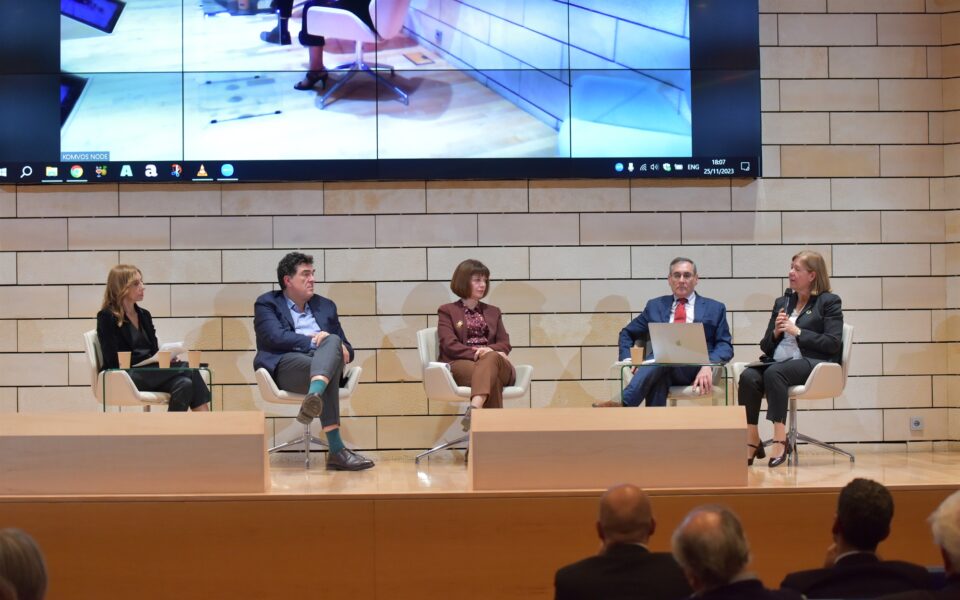Komvos: Bridging academia, business, diaspora to build better future for Greece

Leading academics, business leaders, journalists and public officials gathered at the Megaron Karatzas in Athens on Saturday to set out their vision for how the “Komvos – Networks of Global Hellenism” initiative can harness the extensive international networks of the Greek diaspora to manifestly contribute to the prosperity of Greece. Proceedings opened with Professor Michael Haliassos, professor and chair for macroeconomics and finance at the Goethe University, who stated that “Komvos is more than just a think tank, it is a think act,” and stated that the aim is to do more than just develop theories but to implement proposals that can have an immediate impact on Greek society.
He was followed by Professor Angelos Chaniotis, a member of the faculty of the Institute of Advanced Studies in Princeton, New Jersey, who spoke on the history of Komvos, and its foundation in 2021. “Komvos traces its roots to the basic realization that Hellenism is not confined to the area between Idomeni and the Libyan Sea” but is, in fact, a global community “that navia, and from America to Singapore,” he noted.
He emphasized that the initiative “does not want to act as just another think tank, as there are many, but the hatchery for new activities,” emphasizing the desire to work with other institutions and organizations to achieve the best possible results. Finally, he highlighted the importance of the Greek diaspora, with an emphasis on those that moved away from Greece over the last few decades during the financial crisis.
Academia as a bridge
The first panel of the evening discussed the way in which the global academic and scientific global community of Greeks can contribute to the many risks facing Greece, including geopolitical threats, and act as a national legacy and an important force for global Hellenism.
One of the most-cited reasons why Greeks shine abroad is that they find themselves in organized environments where meritocracy rules
“Why do Greeks shine abroad?” asked journalist Anna Grimani, the moderator of the event, stating that one of the most-cited reasons is that they find themselves in organized environments where meritocracy rules.
The role of the diaspora waxes and wanes in historic cycles, noted Kathimerini Executive Editor Alexis Papachelas, mentioning that there are often significant difficulties in forging ties with those who have moved abroad. He brought up the example of two Greek scientists who were instrumental in the development of unmanned aerial vehicles, and the inability of the Greek state to include them in the development of an efficient defense industry. “We are at a critical juncture,” he stressed, noting that “the big question for me is that apart from the good words, what are the practical steps we can take to get to the next level?” “There is no other way for Greece to soar than for the diaspora to be more organically involved,” he emphasized.
Christina Koulouri, rector of Panteion University, discussed the history of the Greek diaspora, stating that there have been three important waves of Greek migration, with the first two being mostly agricultural workers moving abroad to pursue a brighter future, with their departure not proving negative for the Greek economy, as in fact the overall flow of money toward Greece was positive. However, the last wave of migration, particularly during the crisis, was very costly.
“There is no strategic planning” over the links with the diaspora, she noted, arguing that they instead rely on emotional and familial ties. “We can categorize the diaspora into different groups because they are not homogenous,” she stressed, stating that those Greeks who live in Europe are very different from those in Australia and the United States. Second and third-generation migrants are also different from those who moved abroad to work and study in their 20s, or even later, she added.
“The brain drain is a global phenomenon,” she emphasized, and said that any ideas to attract people, to achieve a so-called brain gain, require growth and a good labor market. If salaries don’t increase, and Greek bureaucracy isn’t simplified they will not work, Koulouri pointed out.
Εvi Sachini, head of the National Documentation Center, discussed a survey conducted by the NDC among PhD holders which revealed that many left, despite having stable salaries in Greece, due to a lack of career prospects and a lack of meritocracy. Many would ideally like to return, she pointed out, but would want to see more reforms implemented.
“We consider that it is important to maintain ties with the scientific community of the diaspora, beyond any emotional or familial ties,” she said, noting that even if there is not a full return, the systematic interaction with the scientific community of the diaspora creates opportunities including mentoring and networking. “I believe what we need to do is to implement more efficient public policies, funded policies, to strengthen ties” and to maintain an organic relationship with Greece, she concluded.
Finally, Professor Chaniotis spoke further about the proposed activities of Komvos, which include training Greek academics in applying for funding from European projects, including logistical and administrative support. He also spoke of a discrepancy between what is offered by Greek universities and the needs of the labor market.
Another goal of the organization is to compile an index of all Greek academics and their work to enable better communication between those working in similar fields. To this end, Chaniotis also discussed the creation of a new institution that can offer mentoring to young academics and will help cement a bridge between academics in Greece and abroad. “Komvos wants to create a different Greece,” he said.





